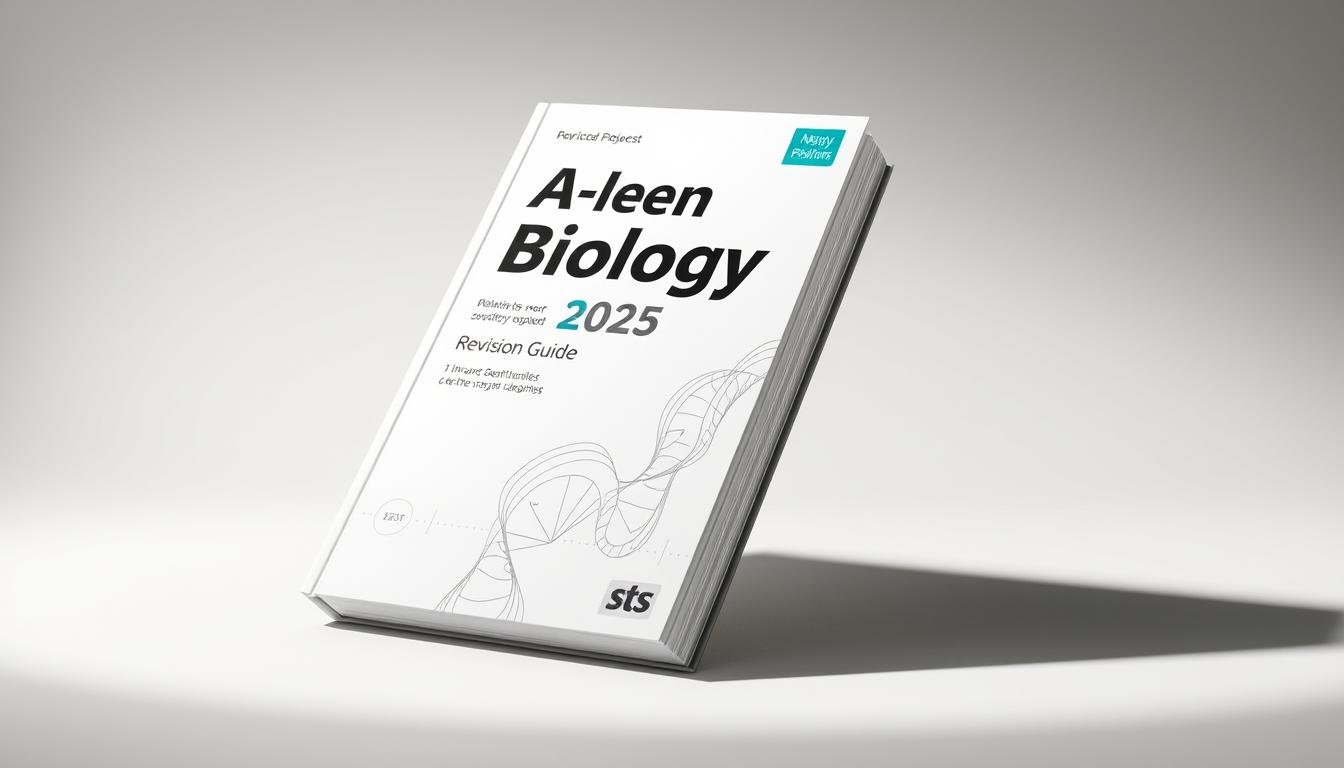As you get ready for your A-Level Biology exams in 2025, you might feel a range of emotions. From feeling confident to being a bit nervous, it’s normal. The secret to doing well is to be well-prepared with the right study tools and a detailed revision guide.
The Cambridge International AS and A Level Biology Revision Guide is a top pick, priced at $51.01. It’s made to help you grasp important concepts and feel ready for the exam.
Key Takeaways
- Comprehensive coverage of A-Level Biology syllabus
- Detailed notes for effective revision
- Textbook recommendations for supplementary study
- Confidence-building study plan
- Exam-focused preparation
Understanding the A-Level Biology Curriculum
Getting ready for your A-Level Biology exams? Knowing the curriculum is key. It’s designed to check your grasp of different biological ideas. Familiarizing yourself with it helps you focus your studying.
Key Topics and Syllabus Breakdown
The A-Level Biology syllabus covers a wide range of topics. These are split into core concepts, optional modules, and practical skills. Knowing these parts is vital for good exam prep.
Core Biological Concepts
Core concepts are the base of the A-Level Biology curriculum. Topics like cellular biology, genetics, and ecology are essential. They help you understand biological processes.
Optional Modules and Specializations
Students can pick from various optional modules. These let you specialize in areas you find interesting. Examples include biotechnology or conservation biology.
Practical Skills Requirements
Practical skills are a big part of A-Level Biology. They test how well you apply what you know in experiments. You’ll need to show you can do lab work, analyze data, and think scientifically.
Assessment Structure and Marking Criteria
A-Level Biology exams have both written and practical parts. Knowing how these are marked and weighted is important for studying.
Written Exams Format
Written exams usually have multiple-choice, short-answer, and essay questions. Getting used to these formats helps you manage your time better during the exam.
Practical Assessment Components
Practical assessments check your experimental skills, data analysis, and conclusion drawing. They’re a key part of the A-Level Biology qualification.
Grade Boundaries and Requirements
It’s important to know the grade boundaries and requirements for A-Level Biology. This helps you set realistic goals and prepare well. Grade boundaries can change between exam boards and years.
| Assessment Component | Weightage | Description |
|---|---|---|
| Written Exams | 80% | Includes multiple-choice, short-answer, and essay-type questions |
| Practical Assessments | 20% | Evaluates experimental skills, data analysis, and scientific inquiry |
Changes in the 2025 Syllabus
The 2025 syllabus for A-Level Biology might have new updates. It’s important to stay informed about these changes. You can find the latest info on official exam board websites or through trusted study resources.
To get ready for the updates, check out the newest study materials. Look for updated textbooks, online guides, and practice exams. These will keep you on track and ensure you’re well-prepared for the exams.
Effective Study Strategies for A-Level Biology
To do well in A-Level Biology, you need good study habits. This subject is tough because it covers complex biological ideas. Using the right study methods can help you understand and remember these concepts better.
Creating a Personalized Study Schedule
Having a study plan that fits you is key. A-Level Biology is hard. It needs you to know a lot about biology. Good study habits can help you get better at this.
Creating a Personalized Study Schedule
Plan your study time carefully. This means making a long-term plan and organizing your study each week and day. Make sure you study both the theory and the practical parts of biology.
Creating a Personalized Study Schedule
Plan your study time carefully. This means making a long-term plan and organizing your study each week and day. Make sure you study both the theory and the practical parts of biology.
Active Learning Techniques for Biology
Using active learning can really help you learn biology better. Try spaced repetition, making concept maps, and testing yourself. These methods are very helpful.
Active Learning Techniques for Biology
Using active learning can really help you learn biology better. Try spaced repetition, making concept maps, and testing yourself. These methods are very helpful.
Note-Taking Methods for Complex Biological Concepts
Good note-taking is important for keeping up with biology. You can use the Cornell Notes system or mind maps to organize your notes. These methods help you keep your notes in order.
| Note-taking Method | Description | Benefits |
|---|---|---|
| Cornell Notes | A systematic method of note-taking that involves dividing your paper into sections for notes, summaries, and review. | Helps in organizing notes and reviewing material efficiently. |
| Mind Mapping | A visual method of note-taking that involves creating maps of related concepts. | Aids in understanding complex relationships between different concepts. |
Using Diagrams and Visual Aids Effectively
Diagrams and visual aids are great for learning biology. They help you see how things work and how they relate to each other. This makes it easier to remember what you’ve learned.
By using these study tips, you can do better in A-Level Biology. You’ll understand biology better and do well in your studies.
A-Level Biology Revision Guide 2025: Essential Resources

Getting ready for your A-Level Biology exams in 2025? You need the right tools. There’s a lot of study material out there. You can pick what works best for you.
Recommended Textbooks and Study Materials
Textbooks are key for A-Level Biology prep. The Cambridge International AS and A Level Biology Revision Guide is top-notch. It has detailed explanations and focuses on the syllabus.
Core Textbooks by Exam Board
Make sure your textbooks match your exam board. For Cambridge International AS and A Level Biology, the Cambridge International AS and A Level Biology Coursebook is a great choice.
Supplementary Study Guides
Supplementary guides offer extra help and practice. Look for ones with detailed explanations, examples, and questions. They help solidify your knowledge.
Revision Cards and Summary Materials
Revision cards and summaries are perfect for quick review. They give you quick overviews of important topics. This makes it easier to remember key information.
Online Platforms and Digital Resources
Online resources can boost your study. Sites like Save My Exams and BioNinja have lots of study materials. They include video tutorials, quizzes, and practice questions.
Video Tutorials and Courses
Video tutorials and online courses offer deep explanations. They make learning fun and engaging. Look for ones made for A-Level Biology.
Interactive Quizzes and Simulations
Interactive quizzes and simulations make learning fun. They help you check your knowledge and see where you need to improve.
Biology Apps and Tools
There are many biology apps and tools to help you study. From flashcards to interactive diagrams, they’re always available.
Practical Experiment Revision Tips
When revising experiments, focus on the key steps and safety. Practice drawing diagrams and explaining procedures. This helps you understand better.
Past Papers and Practice Questions
Past papers and practice questions are essential. They help you get used to the exam format and question types. Practice under timed conditions to get a feel for the real exam.
Mastering Exam Techniques for Biology

To get a high grade in A-Level Biology, you need to improve your exam skills. These skills boost your confidence and help you solve complex questions. Knowing the exam format helps you prepare better for the A-Level Biology exam.
Understanding Command Words in Questions
Command words in exam questions tell you what to do. Knowing the difference between “analyze,” “evaluate,” and “describe” is key. It helps you answer questions right.
Analyze vs. Evaluate vs. Describe
“Analyze” means breaking down information and seeing how it connects. “Evaluate” is about making a judgment based on criteria. “Describe” is about giving a detailed overview of a topic.
Applying Scientific Knowledge
Using your scientific knowledge is essential. It helps you explain things, solve problems, or interpret data.
Common Mistakes to Avoid
Don’t skip reading the question carefully. This can lead to misunderstanding command words. Also, make sure to give specific examples or evidence for your answers.
Structuring Long-Form Answers
Long-form answers need a clear structure. Start with an introduction, explain in detail, and end with a summary of key points.
Introduction and Conclusion Techniques
A good introduction sets the scene for your answer. A strong conclusion summarizes your main points and supports your argument. Use simple and clear language.
Using Biological Terminology Correctly
Using the right biological terms shows you understand the subject. Always use terms correctly and consistently in your answers.
Incorporating Diagrams in Written Answers
Diagrams can make your answers better, mainly for complex biological processes. Make sure your diagrams are clear, labeled, and relevant.
Tackling Data Analysis Questions
Data analysis questions need you to interpret and analyze data. It’s important to understand how to read and interpret this data.
Reading Graphs and Tables
When looking at graphs and tables, find the key trends and patterns. Always refer to specific data points to support your analysis.
Statistical Analysis Basics
Basic statistical analysis includes understanding mean, median, and standard deviation. Using these concepts helps you analyze data better.
Drawing Conclusions from Data
When drawing conclusions from data, make sure they’re backed by evidence. Avoid assumptions not supported by the data.
Time Management During Exams
Managing your time well is key during exams. Plan how to spend your time on each question. This ensures you have enough time for all parts of each question.
Conclusion
You now have a detailed A-Level Biology revision guide. It covers the curriculum, study strategies, and exam techniques. With these resources, you can feel ready for your A-Level Biology exams in 2025.
Good revision isn’t just about memorizing facts. It’s about grasping complex biological ideas and using them in exam questions. The right tools and methods will prepare you for A-Level Biology’s challenges.
Keep focused and manage your time well as you revise. Practice with past papers and questions. This guide will help you reach your goals and do well in your A-Level Biology exams.
FAQ
What are the key topics covered in the A-Level Biology curriculum?
The A-Level Biology curriculum includes core concepts and optional modules. It also focuses on practical skills. You can find a detailed breakdown in our guide.
How can I create an effective study schedule for A-Level Biology?
First, identify your strengths and weaknesses. Then, set realistic goals and plan your time. Our guide offers tips on creating a study plan that suits you.
What are the best online resources for A-Level Biology revision?
Online platforms and digital resources are great for revision. They include textbooks, guides, and practice questions. Check our guide for the best resources.
How can I improve my exam technique for A-Level Biology?
Understand command words and structure long answers. Also, learn to tackle data analysis questions. Our guide helps you master these skills and avoid mistakes.
What are the most recommended textbooks for A-Level Biology?
Recommended textbooks cover the syllabus and offer practice questions. You can find a list in our guide.
How can I access past papers and practice questions for A-Level Biology?
Past papers and questions are available online. You can find them on exam boards’ websites and in revision guides. Our guide shows how to access and use these resources.
What are the changes in the 2025 A-Level Biology syllabus?
The 2025 syllabus may have new assessment structures or topics. Check the exam board’s website or our guide for updates.
How can I use diagrams and visual aids effectively in my A-Level Biology revision?
Diagrams and visual aids help with complex concepts. Our guide offers tips on using them effectively in your revision.





